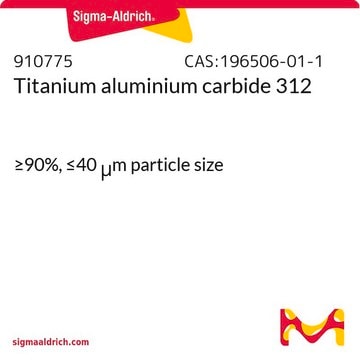932310
Lithium fluoride
Sinónimos:
LiF, Fluorolithium
About This Item
Productos recomendados
assay
≥99%
Quality Level
bp
1681 °C
mp
845 °C (lit.)
solubility
H2O: 2.9 g/L
density
2.64 g/mL at 25 °C (lit.)
orbital energy
HOMO 14 eV
LUMO 1.0 eV
SMILES string
[Li+].[F-]
InChI
1S/FH.Li/h1H;/q;+1/p-1
InChI key
PQXKHYXIUOZZFA-UHFFFAOYSA-M
¿Está buscando productos similares? Visita Guía de comparación de productos
Categorías relacionadas
Application
signalword
Danger
hcodes
Hazard Classifications
Acute Tox. 3 Oral - Eye Irrit. 2 - Skin Irrit. 2 - STOT SE 3
target_organs
Respiratory system
supp_hazards
Storage Class
6.1C - Combustible acute toxic Cat.3 / toxic compounds or compounds which causing chronic effects
wgk_germany
WGK 2
flash_point_f
Not applicable
flash_point_c
Not applicable
Elija entre una de las versiones más recientes:
Certificados de análisis (COA)
Lo sentimos, en este momento no disponemos de COAs para este producto en línea.
Si necesita más asistencia, póngase en contacto con Atención al cliente
¿Ya tiene este producto?
Encuentre la documentación para los productos que ha comprado recientemente en la Biblioteca de documentos.
Nuestro equipo de científicos tiene experiencia en todas las áreas de investigación: Ciencias de la vida, Ciencia de los materiales, Síntesis química, Cromatografía, Analítica y muchas otras.
Póngase en contacto con el Servicio técnico






